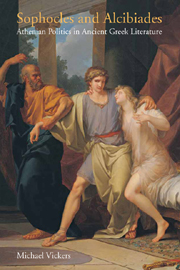Book contents
- Frontmatter
- Contents
- Preface
- 1 The mythologizing of history
- 2 Antigone, Pericles and Alcibiades
- 3 Oedipus Tyrannus, Alcibiades, Cleon and Aspasia
- 4 Ajax, Alcibiades and Andocides
- 5 Philoctetes, Alcibiades, Andocides and Pericles
- 6 Alcibiades in exile: Euripides' Cyclops
- 7 Oedipus at Colonus, Alcibiades and Critias
- 8 Critias and Alcibiades: Euripides' Bacchae
- 9 Alcibiades and Melos: Thucydides 5.84–116
- 10 Thucydides on tyrannicides: not a “digression”
- 11 Alcibiades and Persia (and more Thucydidean “digressions”)
- 12 Alcibiades and Critias in the Gorgias: Plato's “fine satire”
- Epilogue
- Bibliography
- Index locorum
- Index
8 - Critias and Alcibiades: Euripides' Bacchae
- Frontmatter
- Contents
- Preface
- 1 The mythologizing of history
- 2 Antigone, Pericles and Alcibiades
- 3 Oedipus Tyrannus, Alcibiades, Cleon and Aspasia
- 4 Ajax, Alcibiades and Andocides
- 5 Philoctetes, Alcibiades, Andocides and Pericles
- 6 Alcibiades in exile: Euripides' Cyclops
- 7 Oedipus at Colonus, Alcibiades and Critias
- 8 Critias and Alcibiades: Euripides' Bacchae
- 9 Alcibiades and Melos: Thucydides 5.84–116
- 10 Thucydides on tyrannicides: not a “digression”
- 11 Alcibiades and Persia (and more Thucydidean “digressions”)
- 12 Alcibiades and Critias in the Gorgias: Plato's “fine satire”
- Epilogue
- Bibliography
- Index locorum
- Index
Summary
There is rather more to be said about Critias, whom we met in Chapter 7 as an individual Sophocles thought might, under the right circumstances, be the saviour that Athens needed in troubled times. If the positive side of his character embodied in the Theseus of Oedipus at Colonus (as opposed to the negative aspects with which the manipulative and harsh Creon is imbued) were to come to the fore, and if Alcibiades were to accept his leadership, Athens might yet survive. There is a note of muted optimism in Oedipus at Colonus that was to prove to have been misplaced. For Critias gained notoriety as the lawmaker of the Thirty Tyrants, who ruled Athens with a bloody hand after the city's defeat by the Spartans in 405 bce. The sources relating to Critias are few in number by comparison with those that tell us about Alcibiades. This is in large part owing to the fact that Critias' excesses towards the end of his life contributed to the deliberate excision of his actions from Athenian folk memory, formally enacted in the oaths “not to remember evils in the future” (μὴ μνησικακήσειν; Xen. Hell. 2.4.43) once democracy was restored after the fall of the tyrants in 402 bce. This may have contributed to Plato's concealment of Critias' identity behind the figure of Polus in the Gorgias, discussed in Chapter 12.
- Type
- Chapter
- Information
- Sophocles and AlcibiadesAthenian Politics in Ancient Greek Literature, pp. 104 - 114Publisher: Acumen PublishingPrint publication year: 2008



